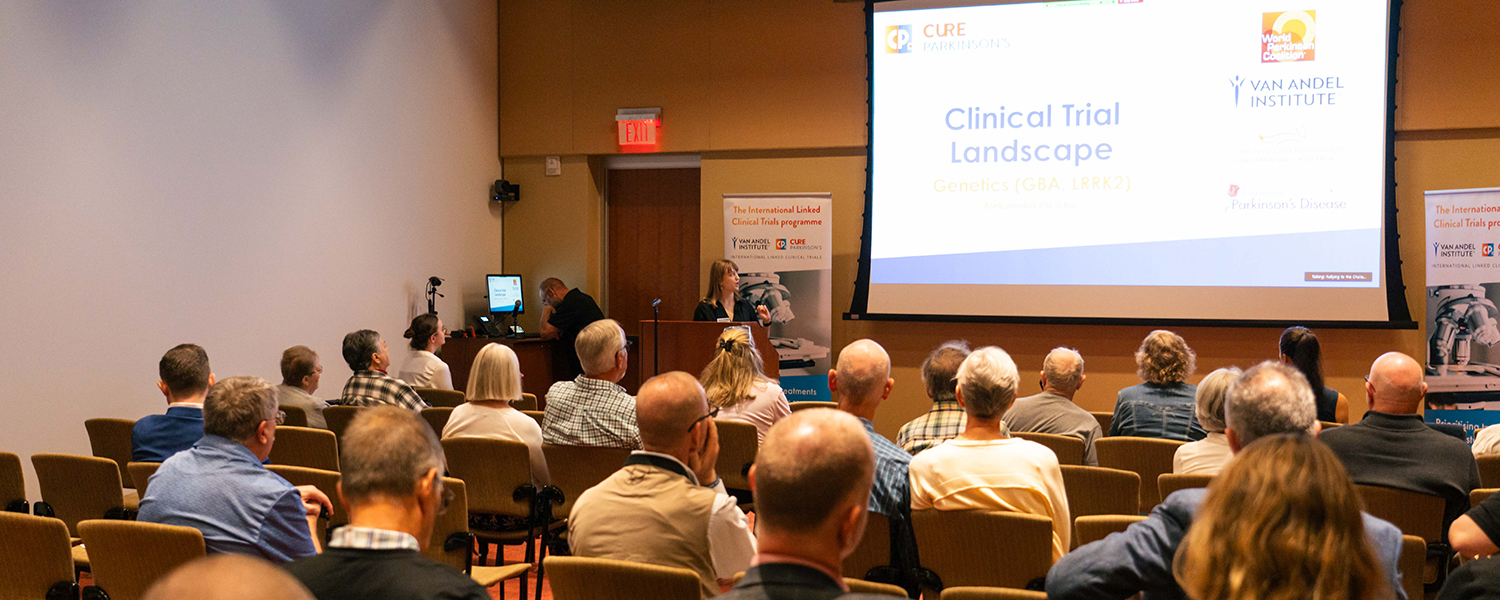
International Linked Clinical Trials Initiative
The International Linked Clinical Trials (iLCT) initiative identifies potential new therapies for Parkinson’s disease from drugs approved to treat other conditions and that have demonstrated neuroprotective effects in preclinical experiments. By using drugs that already have passed rigorous safety and toxicology trials, iLCT aims to significantly cut the amount of time it takes for a potential treatment to move from the laboratory to clinical trials and, ultimately, to the patient. This approach also can reduce the cost of bringing new Parkinson’s disease treatments to fruition.
The expense of clinical trials seriously hampers translation from the lab to the clinic. More than 90 percent of drugs fail during development (Brundin et al 2013). Those that do pass early trials face a long road before they can be used to treat patients — it can take more than a decade and more than $1 billion to move a drug from development to the market.
This is where iLCT comes in. A program spearheaded by Parkinson’s research charity Cure Parkinson’s in collaboration with Van Andel Institute (VAI), iLCT is made up of leading Parkinson’s disease experts from around the world. Members form a committee that prioritizes promising new therapies for clinical trials in hopes of shortening the time it takes to get new treatments to patients.
Clinical Trials
The International Linked Clinical Trials committee meets in person annually to examine dozens of potential therapeutics and selects those that have the highest likelihood of successfully treating Parkinson’s disease. The drugs listed below are currently in clinical trials and have been chosen by the committee based on drug safety, the drug’s ability to pass through the blood-brain barrier, mode of action, ability to measure the drug’s effectiveness, and demonstrated success in preclinical models (Brundin et al 2013).
What is being tested?
Ambroxol is medication used to treat respiratory ailments. It works by clearing mucus, easing coughing, and reducing inflammation. It is approved for use in Europe.
An analysis of preclinical data suggests that ambroxol may aid in the removal of abnormal alpha-synuclein, a protein that clumps together and damages brain cells. Loss of these critical cells contributes to Parkinson’s symptoms.
This phase 3 trial builds on promising results from an earlier phase 2 trial supported by the International Linked Clinical Trials program.
Trial details
Trial name: Ambroxol to slow progression in Parkinson’s disease (ASPro-PD)
ClinicalTrials.gov number: NCT05778617
Trial locations: London, United Kingdom
Related news
Cough medicine offers hope of new treatment to slow the progression of Parkinson’s disease ➔
Simvastatin treats high cholesterol but could have applications in Parkinson’s disease due to its anti-inflammatory properties. Simvastatin’s effects in Parkinson’s are the subject of a clinical trial that is underway across 21 centers in the United Kingdom and is led by University of Plymouth.
To learn more, please visit the Cure Parkinson’s website here.
What was tested?
Exenatide is a type of medication called a GLP-1 receptor agonist. It was originally developed to treat Type 2 diabetes. Earlier phase 2 clinical trial results supported phase 3 testing of this agent.
NOTE (Oct. 14, 2024): Results of a phase 3, multi-center clinical trial indicate there was no significant difference in the progression of motor symptoms between the treatment and placebo groups. Read more from Cure Parkinson’s here.
Trial details
Trial name: Exenatide once weekly over 2 years as a potential disease-modifying treatment for Parkinson’s disease (Exenatide-PD3)
ClinicalTrials.gov number: NCT04232969
Trial location: United Kingdom
Liraglutide is a type 2 diabetes medication. It belongs to a class of drugs called GLP-1 agonists and prompts the release of insulin, thereby lowering glucose levels in the blood when bound to its receptor. Recent laboratory findings suggest that when liraglutide activates these receptors in the brain, the drug provides protection against degenerative damage to key brain cells, specifically those affected in Parkinson’s disease.
Trial details
Trial name: Safety and efficacy of liraglutide in Parkinson’s disease
ClinicalTrials.gov number: NCT02953665
Status: Complete
Trial location: Cedars-Sinai Medical Center (Los Angeles, California)
To read about results of this trial, please click here.
International Linked Clinical Trials Committee
International Linked Clinical Trial committee members hail from some of the leading research organizations in the world and bring with them a vast range of experience studying all facets of Parkinson’s disease. Committee members meet annually to evaluate potential treatments that may be repositioned to treat Parkinson’s disease.
Roger Barker, MBBS, MRCP, Ph.D.
Professor of Clinical Neuroscience
University of Cambridge, Cambridge, U.K.
Jerry Callahan, Ph.D., MBA
Chief Innovation Officer
Van Andel Institute, Grand Rapids, USA
Camille Carroll, M.D.
Honorary Consultant Neurologist
Plymouth Hospitals NHS Trust, U.K.
Mark R. Cookson, Ph.D.
Senior Investigator
National Institute on Aging, National Institutes of Health, Bethesda, MD
Ted Dawson, M.D., Ph.D.
Leonard and Madlyn Abramson Professor of Neurodegenerative Diseases
Johns Hopkins University, Baltimore, USA
David Devos, Ph.D.
Professor of Medical Pharmacology
University of Lille Nord de France, Lille, France
Howard Federoff, M.D., Ph.D.
Executive Vice President for Health Sciences
Executive Dean, School of Medicine
Georgetown University, Washington, D.C., USA
Brian Fiske, Ph.D.
Vice President, Research Programs
The Michael J. Fox Foundation for Parkinson’s Research
New York, New York
Tim Greenamyre, M.D., Ph.D.
Professor & Vice-Chair of Neurology, Movement Disorders Division Director
Pittsburgh Institute for Neurodegenerative Diseases, Pittsburgh, USA
Karl Kieburtz, M.D., MPH
Robert J. Joynt Professor in Neurology
Director of Clinical and Translational Science Institute, University of Rochester Medical Center
University of Rochester, Rochester, USA
Dimitri Krainc, M.D.
Chair, Department of Neurology
Director, Center for Rare Neurological Diseases
Aaron Montgomery Ward Professor
Northwestern University Feinberg School of Medicine, Chicago, USA
Andrew Lees, M.D., F.R.C.P., FMedSci
Professor of Neurology, The National Hospital for Neurology and Neurosurgery, Queen’s Square
Emeritus Director, Reta Lila Weston Institute of Neurological Sciences, University College London Institute of Neurology
University College London, U.K.
Mark Mattson, Ph.D.
Senior Investigator
Chief, Laboratory of Neurosciences
Chief, Cellular and Molecular Sciences Section
Director of the Molecular Neurobiology Lab, Massachusetts General Institute for Neurodegenerative Disease
National Institute on Aging, Baltimore, USA
Darren Moore, Ph.D.
Professor and Chair, Department of Neurodegenerative Science
Van Andel Institute, Grand Rapids, USA
Michael Schwarzschild, M.D., Ph.D.
Professor of Neurology, Harvard Medical School
Director of the Molecular Neurobiology Lab, Massachusetts General Institute for Neurodegenerative Disease
Massachusetts General Hospital and Harvard University, Boston, USA
David Simon, M.D., Ph.D.
Director, Parkinson’s Disease and Movement Disorders and the National Parkinson Foundation Center for Excellence, Beth Israel Deaconess Medical Center
Associate Professor of Neurology, Harvard Medical School, Boston, USA
Simon Stott, Ph.D.
Deputy Director of Research
Cure Parkinson’s, UK
David Sulzer, Ph.D.
Professor
Departments of Psychiatry, Pharmacology, and Neurology
Columbia University Medical Center, New York, USA
Caroline Tanner, M.D., Ph.D., F.A.A.N.
Director, Parkinson’s Disease Research Education and Clinical Center, San Francisco Veterans Affairs Medical Center
Professor of Neurology, University of California, San Francisco, USA
John Trojanowski, M.D.
William Maul Measey-Truman G. Schnabel Professor of Geriatric Medicine and Gerontology
University of Pennsylvania, Philadelphia, USA
Richard Wyse, M.D.
Director of Research and Development
Cure Parkinson’s, UK
Latest from Vai
Learn More
2024 Tom Isaacs Award honors Parkinson’s expert Professor Oliver Bandmann

Cure Parkinson’s and Van Andel Institute announce funding for a phase 1 clinical trial of low-dose lithium in Parkinson’s disease

Phase 2 clinical trial of Type 2 diabetes drug for treatment of Parkinson’s shows positive and promising results
Mullin S, Smith L, Lee K, D’Souza G, Woodgate P, Elflein J, Hällqvist J, Toffoli M, Streeter A, Hosking J, Heywood WE, Khengar R, Campbell P, Hehir J, Cable S, Mills K, Zetterberg H, Limousin P, Libri V, Foltynie T, Schapira AHV. 2020. Ambroxol for the treatment of patients with Parkinson disease with and without glucocerebrosidase gene mutations. JAMA Neuro.
Aviles-Olmos I, Dickson J, Kefalopoulou Z, Djamshidian A, Kahan J, Ell P, Whitton P, Wyse R, Isaacs T, Lees A, Limousin P, Foltynie T. 2014. Motor and cognitive advantages persist 12 months after exendatide exposure in Parkinson’s disease. J Parkinson’s Dis 4(3):337–344.
McNeill A, Magalhaes J, Shen C, Chau KY, Hughes D, Mehta A, Foltynie T, Cooper MJ, Abramov AY, Gegg M, Schapira AHV. 2014. Ambroxol improves lysosomal biochemistry in glucocerebrosidase mutation-linked Parkinson disease cells. Brain 137(5):1481–1495.
Brundin P, Barker R, Conn PJ, Dawson TM, Kieburtz K, Lees AJ, Schwarzschild M, Tanner CM, Isaacs T, Duffen J, Matthews H, Wyse RKH. 2013. Linked Clinical Trials—The development of new clinical learning studies in Parkinson’s disease using screening of multiple prospective new treatments. J Parkinson’s Dis 3:231-239.
Schapira AHV, Gegg ME. 2013. Glucocerebrosidase in the pathogenesis and treatment of Parkinson’s disease. Proc Natl Acad Sci U S A 110(9):3214–3215.
Dodson MW, Guo Ming. 2007. Pink1, Parkin, DJ-1 and mitochondrial dysfunction in Parkinson’s disease. Curr Opin Neurobiol 17(3):331–337.
